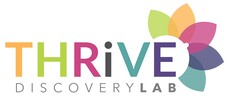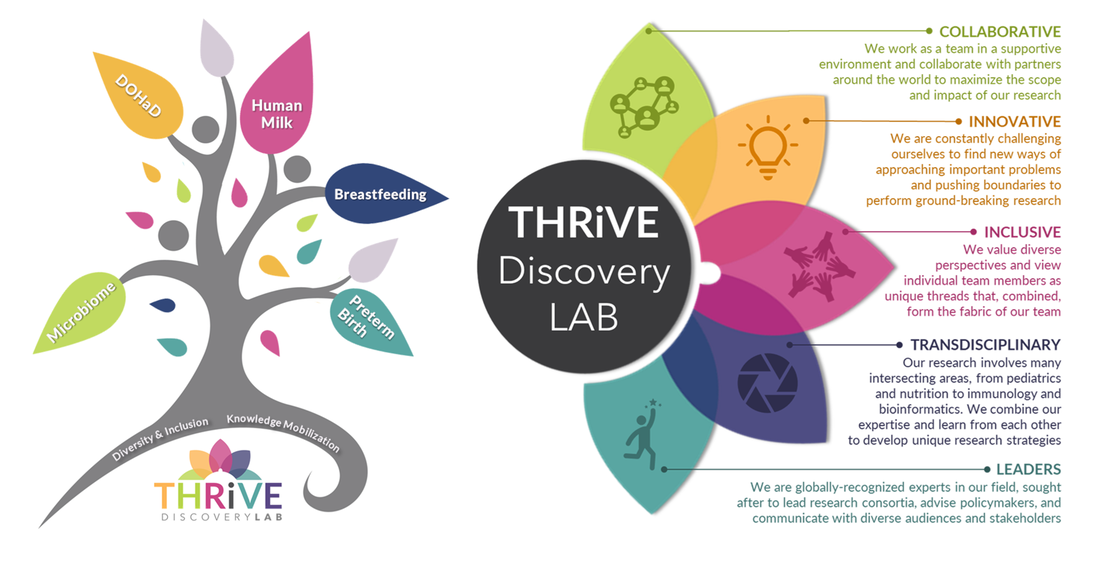Why THRiVE?
Our research strives to help mothers, babies, and families THRiVE and reach their potential.
Our Team Science and Diversity, Equity, and Inclusion philosophies help each lab member THRiVE personally and professionally in our unique environment.
Our Team Science and Diversity, Equity, and Inclusion philosophies help each lab member THRiVE personally and professionally in our unique environment.
Developmental Origins of Health and Disease (DOHaD)
We study how early-life exposures and experiences shape lifelong health. Our current research is focused on the role of maternal nutrition, infant feeding and human milk composition in growth and development during infancy and childhood.
Our team is transdisciplinary, combining expertise in molecular biology, epidemiology, statistics, nutrition, microbiome and maternal-child health. We collaborate and use model systems, clinical cohorts, and administrative databases to study DOHaD in cells, animals and human populations.
If you are interested in graduate or postgraduate training in the THRiVE Discovery Lab, please review this information.
Our team is transdisciplinary, combining expertise in molecular biology, epidemiology, statistics, nutrition, microbiome and maternal-child health. We collaborate and use model systems, clinical cohorts, and administrative databases to study DOHaD in cells, animals and human populations.
If you are interested in graduate or postgraduate training in the THRiVE Discovery Lab, please review this information.
Research Platforms
|
|
|
Current Projects
Human Milk
- The International Milk Composition (IMiC) Consortium: Understanding the determinants and consequences of variation in human milk composition in low, middle and high-income settings
- The Multi-omic Milk (MuMi) Study: Leveraging the IMiC Platform and the CHILD Cohort to study human milk as a biological system and understand its composition, determinants and impacts on child health
- Milk chronobiology: how does milk composition change diurnally and longitudinally over lactation?
- Liquid gold: how colostrum sets the stage for healthy growth and development
- Genome-wide association studies of human milk composition
- Lactation support and education in Manitoba; collaborative research with the Winnipeg Breastfeeding Centre
- Lactation and innate immunity among mothers in the CHILD cohort
- Stakeholder engagement to inform strategies for improving breastfeeding education in Manitoba schools
- Matching Donor Human Milk on Maternal Secretor Status (MMOMSS): optimizing the prebiotic profile of donor human milk for preterm infants (pilot RCT)
- The Optimizing Nutrition and Milk (OptiNuM) Study: Understanding how human milk and the infant microbiome shape growth and neurodevelopment in premature infants
- Impact of human-milk based fortifiers on gut microbiota and oxidative stress in premature infants
- Role of infant feeding practices in the development and prevention of chronic disease (allergies, asthma, obesity)
- Infant feeding and child behaviour: understanding the link through five potential mechanistic pathways in the CHILD cohort
- Human milk feeding practices and immune development in the CHILD cohort
- A decade of development: the gut microbiome from birth to 10 years in the CHILD cohort
- Causational roles of the gut, nasal and breastmilk microbiomes in childhood asthma: leveraging the CHILD cohort study
- DenBalo: Describing and comparing microbiome, immune system and breastmilk component development in pre-and full-term infants in urban Burkina Faso








